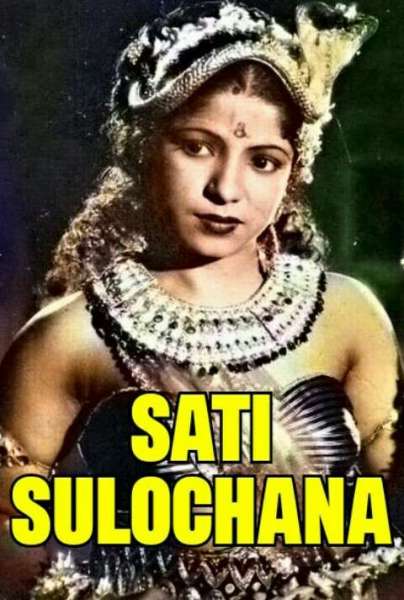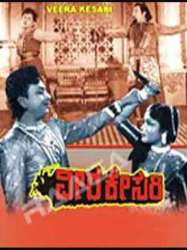Sati Sulochana is a film directed by Yaragudipati Varada Rao with Yaragudipati Varada Rao
Sati Sulochana (1934)

If you like this film, let us know!
Sati Sulochana (Kannada: ಸತಿ ಸುಲೋಚನ) is an 1934 Indian Kannada-language film directed by Y. V. Rao. The film was released in the year 1934 and is the first talkie film in Kannada language. It is also the first film to be screened in the erstwhile Mysore Kingdom.
Synopsis
Sati Sulochana is based on the character Sulochana from the Ramayana. She is the wife of Indrajit and the daughter-in-law of Ravana, the demon-king in Ramayana. The film tries to portray the goings on of the war between the Hindu god Rama and Ravana as seen from the point of view of Sulochana. Ravana abducts Rama's wife Sita to his kingdom of Lanka, drawing Rama into a war. In the course of the war, Rama's brother Lakshman is knocked unconscious by an arrow from Indrajit and is revived by a medicinal herb called Sanjeevani. The revived Lakshman kills Indrajit and makes Sulochana a widow. Ravana's defeat by Lord Rama and the killing of Indrajit is viewed through the eyes of Sulochana. Unable to bear the pain of husband's death, Sulochana commits sati sacrifice.Actors
Comments
Leave comment :
Suggestions of similar film to Sati Sulochana
There are 15 films with the same actors, 3 films with the same director, to have finally 16 suggestions of similar films.If you liked Sati Sulochana, you will probably like those similar films :

Viswa Mohini (1940)
, 3h15Directed by Yaragudipati Varada Rao
Actors Chittor V. Nagaiah, Yaragudipati Varada Rao, Pushpavalli
Purushottam (Y.V. Rao) embezzles money from a firm of brokers owned by Padmanabham in order to get his son Mohan Rao married to Hemalatha, daughter of the millionaire Visalakshamma (B Rajaratnam). The now impoverished Padmanabham partially gets his own revenge when his daughter Sushila (Lalitha Devi) becomes a film star Viswa Mohini.

Chintamani (1937)
, 3h35Directed by Yaragudipati Varada Rao
Genres Biography
Actors M. K. Thyagaraja Bhagavathar, Yaragudipati Varada Rao
Chintamani was based on the legendary story of a Sanskrit poet and devotee of Lord Krishna named Bilwamangal (M. K. Thyragaraja Bhagavathar). Bilwamangal, a resident of Varanasi, was a Sanskrit scholar, who gets infatuated towards a courtesan called Chintamani (Aswathamma), a woman of ill-fame. As a result, he deserts his wife. However, Chintamani is an ardent devotee of Lord Krishna (Serugalathur Sama) and spends most of her time singing bhajans in praise of Lord Krishna. His attraction towards Chintamani eventually draws Bilwamangal closer towards Lord Krishna and transforms his life forever. Bilwangal, himself, becomes a devotee of Lord Krishna and pens a monumental Sanskrit work Sri Krishna Karnamritam.

Captain Nagarjuna (1986)
, 1h50Directed by Yaragudipati Varada Rao
Actors G. Varalakshmi, Akkineni Nagarjuna, Kushboo Sundar

Satya Harishchandra (1943)
, 1h59Themes Films based on mythology, Films about religion
Actors M. V. Subbaiah Naidu, R. Nagendra Rao

Veerakesari (1963)
Directed by B.VITHALA ACHARYA
Genres Drama, Action, Adventure, Historical
Actors Rajkumar, T. N. Balakrishna, Udaykumar, R. Nagendra Rao, T. R. Narasimharaju, Leelavathi
Rating81%






Pathiye Daiva (1963)
Directed by R. Nagendra Rao
Actors R. N. Sudarshan, Kalpana, Jayanthi, R. Nagendra Rao, Pandari Bai
 Connection
Connection



